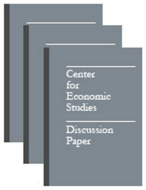Housing Booms and the U.S. Productivity Puzzle
Housing Booms and the U.S. Productivity Puzzle
Abstract
The United States has been experiencing a slowdown in productivity growth for more than a decade. I exploit geographic variation across U.S. Metropolitan Statistical Areas (MSAs) to investigate the link between the 2006-2012 decline in house prices (the housing bust) and the productivity slowdown. Instrumental variable estimates support a causal relationship between the housing bust and the productivity slowdown. The results imply that one standard deviation decline in house prices translates into an increment of the productivity gap -- i.e. how much an MSA would have to grow to catch up with the trend -- by 6.9p.p., where the average gap is 14.51%. Using a newly-constructed capital expenditures measure at the MSA level, I find that the long investment slump that came out of the Great Recession explains an important part of this effect. Next, I document that the housing bust led to the investment slump and, ultimately, the productivity slowdown, mostly through the collapse in consumption expenditures that followed the bust. Lastly, I construct a quantitative general equilibrium model that rationalizes these empirical findings, and find that the housing bust is behind roughly 50 percent of the productivity slowdown.
Others in Series
Working Paper
Working Paper
Working Paper




